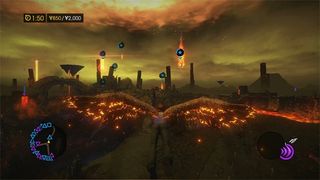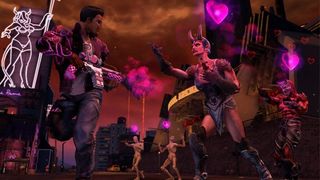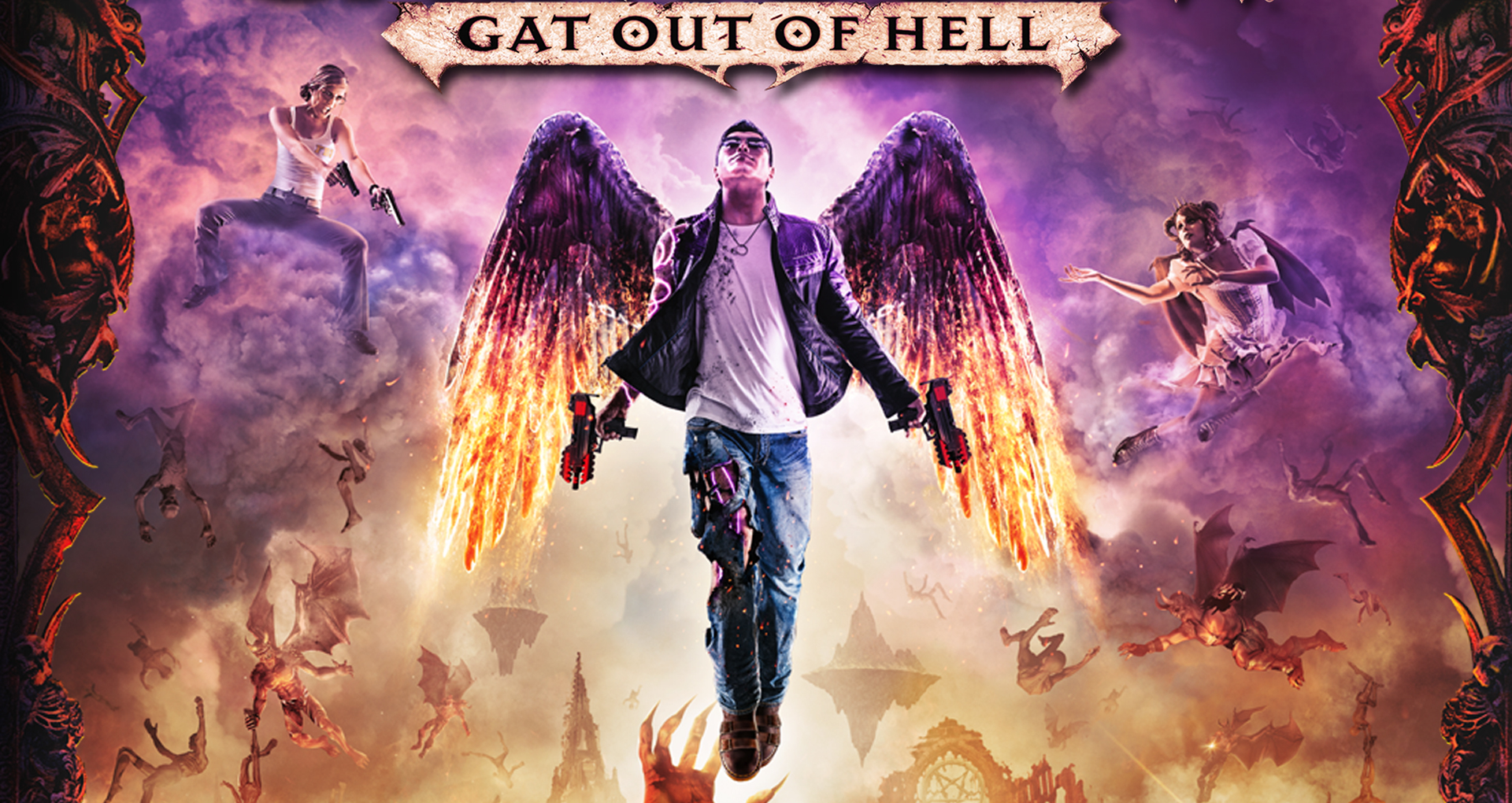12DOVE Verdict
Another ludicrous spectacle, but Volition’s patchy action/comedy sandbox doesn’t prove to be a gangster’s paradise.
Pros
- +
Flying provides a fun and fast new way to get around
- +
Two-player online co-op is there if you want it
- +
The series is still capable of clobbering you with its funny bone
Cons
- -
Hell is not a very nice place to play around in. Who knew?
- -
An arbitrary stamina meter limits fun to 15-second bursts
- -
There are no campaign missions
- -
only 'Diversions'
Why you can trust 12DOVE
In Saints Row IV, an evil alien race called the Zin blow up Earth and plonk the remaining humans in a giant Matrix-like mainframe that replaces reality. But forget about all that! While five-hour standalone expansion Gat out of Hell begins where the last one ends - with the surviving Saints travelling the stars in a spaceship - it blasts off in a different trajectory entirely. During a friendly game of ouija board, the President of the United States (you from the last game) is sucked down to the depths of Hell by the Devil, who wants a husband for his daughter, Jezebel. But the Saints don’t abide kidnappings or arranged marriages, and by freely switching between Vanilla Ice-alike Johnny Gat and feisty nerd Kinzie Kingston it’s your duty to rescue the POTUS.
Unlike the last game, the setting of New Hades is a completely fresh, if smaller, open world, one comprised of five islands surrounding a central tower in the middle. Causing havoc in Shantytown, Barrens, Downtown, Forge, and the Den attracts the Devil’s attention - think of it like throwing eggs at Trump Tower. Only by completing Diversions - minigames, ostensibly - do you fill a ‘Satan’s wrath meter’ and progress through the story. Traditional campaign missions are sorely missed: no more racing chariots with auto-tuned pimps, no more skydiving shootouts, and forget about cavorting around computer simulations as a toilet. As a result Gat out of Hell often feels like a collection of minigames.

Other features central to Saints Row have also been given the snip - the character customisation, the gang warfare, the pimpable rides, the exotic cribs. All gone, and with it, that familiar Saints Row feeling. Hordes of identical, grey-skinned husks replace pedestrians; architecture is distressed and imposing, and the perpetually dark sky menaces. Hey, at least there’s two-player campaign co-op so you can bum out a friend.
Worse, the Diversions that Gat out of Hell chooses to focus on are old hat, returning from games as far back as the original with only slight twists. Insurance Fraud is unimaginatively renamed Torment Fraud and sees you throw a shambling prisoner of Hell into traffic not for money but to knock years of their sentence. The only practical difference are running animations and units of measurement.


Gat out of Hell is a standalone expansion to Saints Row IV, meaning you don’t need to own that game to play this. So, how do you get your hands on it? There are two ways. If you own either a PS4 or Xbox One, Gat out of Hell comes bundled with the enhanced edition of Saints Row IV, called Saints Row IV: Re-Elected. Alternatively, you can download Gat out of Hell separately on either PSN or Xbox Live’s marketplace. PC owners can download the expansion on Steam for £14.99.
Mayhem events are as they ever were (destroy property within a time limit) and so is Survival (kill three waves of enemies). There’s King of the Hill in Soul Extraction Facilities, a target-based game where you have to bat popped-collar demon bros through hoops, and one where you have to drive a damaged car without hitting anything and exploding. They’re all mindless, madcap fun and rarely feel like filler, but if you’ve played literally any game in the Saints Row series you’ll be struck by a powerful sense of deja vu.
At least your character’s abilities mark a difference. You can super sprint, super jump, and super fly, which would all be great were it not for the arbitrary stamina meter that forces you to jog about a bit while it recharges. Still, flying is exhilarating, albeit in 15-second bursts, with a flap of your angel wings propelling you to eye-watering speeds. And the Diversions associated with them, where you have to catch falling souls and race through winding skybound checkpoints, are among the game’s most engaging.

Throughout the story you’ll unlock four different supernatural powers and flick between them on the D-pad. Stomp lets you pound the ground for a destructive shockwave, Summon gives you the ability to conjure a mischievous minion who scampers up enemies’ backs and slashes them repeatedly, Aura allows you to set yourself on fire and spread it to others, and Blast turns foes to stone ready to be shattered.
Handily, each has a separate cooldown meter so you can use one while another recharges and chain frantic attacks. Start with a stomp, for instance, before flinging a summon to act as a distraction, then use blast or aura, then switch back to stomp and repeat until your eyes go weird. Modifications on your four existing powers, unlocked by activating an altar, before surviving an onslaught of leather-clad demons, buzzsaw imps, and kamikaze monster trucks, mix things further. Stomp has both a vacuum modifier that sucks in enemies, and a flash version that stuns everyone with holy light.

There’s insane new weaponry, too. Hell doesn’t do shops, so you’ll simply use a Sinterpol Armoury vending machine to extract the likes of the Exodus SMG - that shoots a stream of blood-sucking locusts - a pistol that turns enemies into showers of cash, an Impaler crossbow that fires stakes, the explosive-frog-launching Lil’ Croaker, and a drivable armchair with pop-out miniguns.
Like before you can upgrade them if you’ve got the cash. Frogs that hop from the Lil’ Croaker will be given longer tongues for better range, for instance, while the Impaler’s stakes will turn explosive. But while conceptually inventive, weapons still function pretty normally. The Lil’ Croaker is essentially a grenade launcher that goes “Ribbet”, and the Exodus SMG works just like a normal SMG but with weird ass buzzing bullets. It feels like a nod towards originality, but creativity seems to exist at face value. Don’t expect Inflato-Rays or Dubstep Guns.

Still, the gags deliver, and that’s the main thing. After all, Saints Row long ago prioritised being a comedy game above, say, a game which makes a lick of sense (see President getting sucked into Hell through a possessed ouija board). Despite its unwelcoming vibe, the setting has character. There are billboards along Hell’s highway, stating, ‘You blew it. Just think about that forever,’. There are cameos from historic tossers, like Vlad the Impaler whose castle has become a haven for frat parties while he serves time in a penitentiary, and Shakespeare who DJs for a club called The Tempest after selling his soul for fame on Earth. And there’s an absolutely ripping Disney-esq musical number halfway through.
Alas, the expansion suffers from the problems of its predecessors. The more self-consciously weird it gets, the easier it is to lose interest. By this point the so-called ‘awesome button’ - that lets you perform running hurricanranas and dropkick yourself behind the wheels of vehicles - is more of an ‘alright button’, the feeling of dissociation rising in direct relation to the ludicrous spectacle. While Gat out of Hell is easy to play, geared as it is towards brainless carnage, it’s also very hard to care about it. There’s a saying about Saints Row games - that it’s a stupid game made by clever people. That still rings true with Gat out of Hell, Volition using its funny bone like a blunt object. You’ll laugh occasionally, but it’ll be an inadvertent laugh, like air escaping from a balloon.

This game was reviewed on PS4.
More info
| Genre | Action |
| Description | Rescue the president from Satan and his demon army. |
| Franchise name | Saints Row |
| Platform | "PS3","Xbox 360","PS4","Xbox One","PC" |
| US censor rating | "Rating Pending","Rating Pending","Rating Pending","Rating Pending","Rating Pending" |
| UK censor rating | "","","","","" |
| Release date | 1 January 1970 (US), 1 January 1970 (UK) |

Gen V creator gives exciting update on second season of The Boys spin-off

Bill Murray regrets not working with one director in his illustrious career: “It’s one of the few regrets I have is that I didn’t do it."

Ryan Coogler promises "I’ve got every intention of working" with Denzel Washington on Black Panther 3











